Local
Hundreds march against anti-LGBT violence
D.C. police chief, four Council members join demonstration
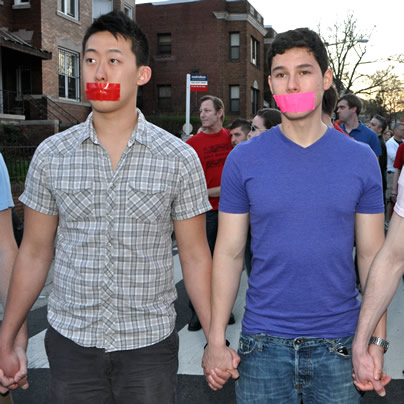
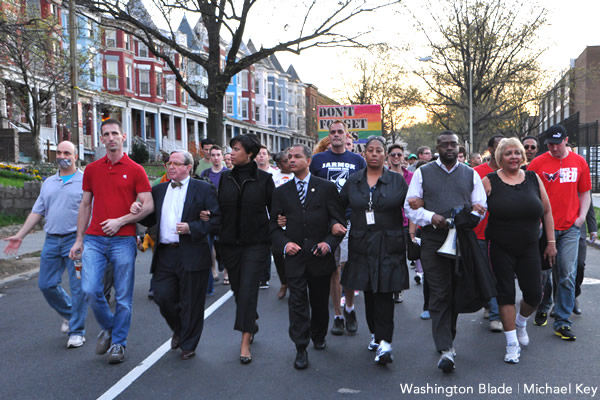
Mayor's Office LGBT liaison Jeffrey Richardson, and council members Muriel Bowser and Jim Graham join D.C. residents in calling for an end to anti-LGBT violence. (Washington Blade photo by Michael Key)
As many as 700 people turned out for a march through the streets of Washington, D.C., Tuesday night to take a stand against anti-LGBT violence following separate attacks against two gay men and a transgender woman during a two-day period earlier this month.
Friends of one of the two gay male victims, who organized the march, said they were astonished over the outpouring of support that emerged from the LGBT community and city officials, including D.C. Police Chief Cathy Lanier and four members of the City Council.
“It was a Facebook event and I expected maybe 15 to 50 people to show up,” said Patrick Pressman, one of the lead organizers. “And then from there it just exploded,” he said. “It got to where it was today, when it was estimated that about 700 people were going to attend.”
Pressman said he is a friend of a 29-year-old gay man who was robbed and badly beaten on March 12 by assailants who called him anti-gay names at Georgia Avenue and Irving Street, N.W.
The march started outside the International House of Pancakes restaurant at 14th and Irving streets, N.W., in Columbia Heights, where a 31-year-old gay man was shot about 6 a.m. Sunday, March 11, in what police say was an altercation with two men who called him anti-gay names.
Lanier, who spoke to the marchers as they gathered outside the IHOP restaurant, said she expects an arrest in the case soon, saying she is “very pleased” with the progress of the investigation.
“We have everybody working on this and I think everybody’s committed,” she said. “We kind of take it personally when people in our community are targeted.”
SEE DOZENS OF PICTURES FROM THE MARCH IN THE WASHINGTON BLADE PHOTO GALLERY HERE.
Police said the victim of the IHOP shooting was fortunate to have received a non-life threatening gunshot wound. His cousin, who was with him at the time of the shooting, said the victim was expected to be released from the hospital this week after being treated for a punctured liver.
Gay D.C. Council member Jim Graham (D-Ward 1), who participated in the march, said he was especially concerned that two of the incidents took place in his ward. He said the large showing of support for the march demonstrates that the community is outraged over anti-LGBT violence.
From the IHOP, the march traveled east on Irving Street to Georgia Avenue, the site where the 29-year-old gay man was attacked and beaten about 9:30 p.m. on March 12.
Police said the transgender woman was attacked and knocked unconscious about 11:45 that same night at the intersection of West Virginia Avenue and Mt. Olivet Road, N.E. People who know the victim said she reported later that she was not robbed and thought the attack was motivated by anti-transgender bias.
But police say, unlike the other two incidents, they have not listed the case as a hate crime because they don’t have sufficient evidence for such a classification. Assistant D.C. Police Chief Peter Newsham told a meeting of the Gertrude Stein Democratic Club Monday night that investigators were looking for witnesses who might have heard whether the attackers hurled anti-trans names at the victim.
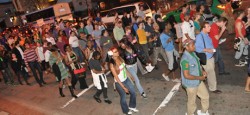
Hundreds of marchers joined the hastily assembled march organized after a recent spate of anti-gay violence in the nation's capital. (Washington Blade photo by Michael Key)
Newsham said investigators believe the three incidents were unrelated, with the attacks carried out by different groups of perpetrators.
The march paused when it reached the site where the 29-year-old gay man was attacked at Georgia Avenue and Irving Street.
“I want to say that this walk should never have to happen again in our city,” said D.C. Council Chair Kwame Brown (D-At-Large). “We have to do more. We must do more,” he said. “And for those who know about this horrific situation that took place, I’m begging you to come forth. Give us information … to bring these folks to justice.”
Brown was referring to reports by police that many people were on the street in the vicinity of the attack at the time it occurred.
Council members Michael Brown (D-At-large) and Muriel Bowser (D-Ward 4) also participated in the march, saying they were in solidarity with the LGBT community in seeking ways to curtail hate violence against all city residents.
Also participating in the march was Jeffrey Richardson, director of Mayor Vincent Gray’s Office of LGBT Affairs, and Gustavo Velasquez, director of the D.C. Office of Human Rights. Richardson spoke at the gathering outside the IHOP restaurant.
Among those speaking at the Georgia Avenue and Irving Street site was A.J. Singletary, president of the D.C. group Gays and Lesbian Opposing Violence (GLOV). Singletary said he learned from the 29-year-old gay victim’s partner that the victim had been released from the hospital Tuesday, the day of the march.
“His jaw was shattered in two places,” said Singletary. “After two surgeries he now has permanent titanium plates holding his lower jaw together. In addition, his jaw is wired shut for the next four to six weeks.”
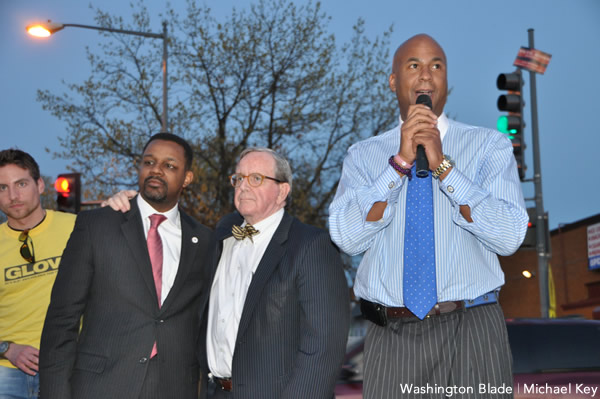
A.J. Singletary, Kwame Brown, Jim Graham, and Michael Brown at the rally. (Washington Blade photo by Michael Key)
The march continued south on Georgia Avenue to U Street, where it turned right and traveled to 14th Street. From there, with spectators looking on from the sidewalks, it traveled south on 14th to R Street, where it turned right and continued to its termination at 17th Street next to the gay bar Cobalt. Many of the marchers entered Cobalt, which hosted a fundraiser for the victim attacked at Georgia Avenue and Irving Street.
Gay Democratic activist Cartwright Moore, a member of the staff of D.C. Congressional Del. Eleanor Holmes Norton, said many of the march participants were young LGBT people who don’t ordinarily attend meetings of local LGBT organizations.
“It’s been great that the community has come together on an issue like this,” said D.C. resident Chris Shank, who said he learned about the march through a Facebook invitation.
“I marched the entire way,” he said. “I’m really glad it was organized. I think the response has been enormous.”
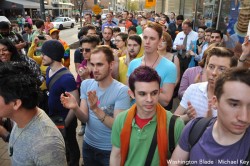
The event was largely organized through social networks like Facebook and Twitter, and the overwhelming number of young people in the crowd reflected these new media organizing tactics. (Washington Blade photo by Michael Key)
D.C. resident Phillip Pratt said he, too, learned of the event through Facebook. He said he became motivated to get involved after seeing that just a few days after organizers posted the event more than 500 people had committed to joining the march.
“I think it was very important to come out and march for this, to march with them and show our support,” he said.
Vic Suter said she wanted to take a stand against violence targeting her own community.
“Whether there be a thousand people marching down the street or five, it says that people are not going to tolerate such behavior and that we need to bring about tolerance and we need to teach the community that people are people regardless of who they love,” she said.
Asked if he thought the event would have an impact on the community, Singletary said he was hopeful that it would.
“We have a group of many hundreds walking down the middle of the street down major thoroughfares in D.C. where a lot of hate crimes have occurred,” he said while marching. “You’re talking about U Street, you’re talking about 14th Street. The street we’re on now is R. There have been a lot of attacks on this street itself. So the response by the community has been big and rightfully so.”
Virginia
Arlington LGBTQ bar Freddie’s celebrates 25th anniversary
Owner asks public to support D.C.-area gay bars

An overflowing crowd turned out Sunday night, March 1, for the 25th anniversary celebration of Freddie’s Beach Bar, the LGBTQ bar and restaurant located in the Crystal City section of Arlington, Va.
The celebration began as longtime patrons sitting at tables and at the bar ordered drinks, snacks, and full meals as several of Freddie’s well-known drag queens performed on a decorated stage.
Roland Watkins, an official with Equality NoVa, an LGBTQ advocacy organization based in the Northern Virginia areas of Arlington, Alexandria, and Fairfax County, next told the gathering about the history of Freddie’s Beach Bar and the role he said that owner Freddie Lutz has played in broadening the bar’s role into a community gathering place.
“Twenty-five years ago, opening a gay bar in Arlington was not a given,” Watkins told the crowd from the stage. “It took courage, convincing, and a deep belief that our community belongs openly, visibly, and proudly,” he said. “And that belief came from Freddie.”
Watkins and others familiar with Freddie’s noted that under Lutz’s leadership and support from his staff, Freddie’s provided support and a gathering place for LGBTQ organizations and a place where Virginia elected officials, and candidates running for public office, came to express their support for the LGBTQ community.
“Over the past 25 years, Freddie’s has become more than a bar,” Watkins said. “It has become a community maker.”
Lutz, who spoke next, said he was moved by the outpouring of support from long-time customers. “Thank you all so much for coming tonight and thank you all so much for your support over the past 25 years,” he said. “I can’t tell you how much that means to me and how much it’s kept me going.”
But Lutz then said Freddie’s, like many other D.C. area gay bars, continues to face economic hard times that he said began during the COVID pandemic. He noted that fewer customers are coming to Freddie’s in recent years, with a significant drop in patronage for his once lucrative weekend buffet brunches.
“So, I don’t want to be the daddy downer on my 25-year anniversary,” he said. “But this was actually the worst year we’ve ever had,” he added. “And I guess what I’m asking is please help us out. Not just me, but all the gay bars in the area.” He added, “I’m reaching out and I’m appealing to you not to forget the gay bars.”
Lutz received loud, prolonged applause, with many customers hugging him as he walked off the stage.

In an official statement released at the reveal event Capital Pride Alliance described its just announced 2026 Pride theme of “Exist, Resist, Have the Audacity” as a “bold declaration affirming the presence, resilience, and courage of LGBTQ+ people around the world.”
The statement adds, “Grounded in the undeniable truth that our existence is not up for debate, this year’s theme calls on the community to live loudly and proudly, stand firm against injustice and erasure, and embody the collective strength that has always defined the LGBTQ+ community.”
In a reference to the impact of the hostile political climate, the statement says, “In a time when LGBTQ+ rights and history continue to face challenges, especially in our Nation’s Capital, where policy and public discourse shape the future of our country, together, we must ensure that our voices are visible, heard, and unapologetically centered.”
The statement also quotes Capital Pride Alliance CEO and President Ryan Bos’s message at the Reveal event: “This year’s theme is both a declaration and a demand,” Bos said. “Exist, Resist, Have Audacity! reflects the resilience of our community and our responsibility to protect the progress we’ve made. As we look toward our nation’s 250th anniversary, we affirm that LGBTQ+ people have always been and always will be part of the United States’s history, and we will continue shaping its future with strength and resolve,” he concluded.
District of Columbia
Capital Pride board member resigns, alleges failure to address ‘sexual misconduct’
In startling letter, Taylor Chandler says board’s inaction protected ‘sexual predator’

Taylor Lianne Chandler, a member of the Capital Pride Alliance Board of Directors since 2019 who most recently served as the board’s secretary, submitted a letter of resignation on Feb. 24 that alleges the board has failed to address instances of “sexual misconduct” within the Capital Pride organization.
The Washington Blade received a copy of Chandler’s resignation letter one day after she submitted it from an anonymous source. Chandler, who identifies as transgender and intersex, said in an interview that she did not send the letter to the Blade, but she suspected someone associated with Capital Pride, which organizes D.C.’s annual LGBTQ Pride events, “wants it out in the open.”
“It is with a heavy heart, but with absolute clarity, that I submit my resignation from the Capital Pride Alliance Board of Directors effective immediately,” Chandler states in her letter. “I have devoted nearly ten years of my life to this organization,” she wrote, pointing to her initial involvement as a volunteer and later as a producer of events as chair of the organization’s Transgender, Gender Non-Conforming, and Intersex Committee.
“Capital Pride once meant something profound to me – a space of safety, visibility, and community for people who have often been denied all three,” her letter continues. “That is no longer the organization I am part of today.”
“I, along with other board members, brought forward credible concerns regarding sexual misconduct – a pattern of behavior spanning years – to the attention of this board,” Chandler states in the letter. “What followed was not accountability. What followed was retaliation. Rather than addressing the substance of what was reported, officers and fellow board members chose to chastise those of us who came forward.”
The letter adds, “This board has made its priorities clear through its actions: protecting a sexual predator matters more than protecting the people who had the courage to come forward. … I have been targeted, bullied, and made to feel like an outsider for doing what any person of integrity would do – telling the truth.”
In response to a request from the Blade for comment, Anna Jinkerson, who serves as chair of the Capital Pride board, sent the Blade a statement praising Taylor Chandler’s efforts as a Capital Pride volunteer and board member but did not specifically address the issue of alleged sexual misconduct.
“We’re also aware that her resignation letter has been shared with the media and has listed concerns,” Jinkerson said in her statement. “When concerns are brought to CPA, we act quickly and appropriately to address them,” she said.
“As we continue to grow our organization, we’re proactively strengthening the policies and procedures that shape our systems, our infrastructure, and the support we provide to our team and partners,” Jinkerson said in her statement. “We’re doing this because the community’s experience with CPA must always be safe, affirming, empowering, and inclusive,” she added.
In an interview with the Blade, Chandler said she was not the target of the alleged sexual harassment.
She said a Capital Pride investigation identified one individual implicated in a “pattern” of sexual harassment related behavior over a period of time. But she said she was bound by a Non-Disclosure Agreement (NDA) that applies to all board members and she cannot disclose the name of the person implicated in alleged sexual misconduct or those who came forward to complain about it.
“It was one individual, but there was a pattern and a history,” Chandler said, noting that was the extent of what she can disclose.
“And I’ll say this,” she added. “In my opinion, with gay culture sometimes the touchy feely-ness that goes on seems to be like just part of the culture, not necessarily the same as a sexual assault or whatever. But at the same time, if someone does not want those advances and they’re saying no and trying to push you away and trying to avoid you, then it makes it that way regardless of the culture.”
When asked about when the allegations of sexual harassment first surfaced, Chandler said, “In the past year is when the allegation came forward from one individual. But in the course of this all happening, other individuals came forward and talked about instances – several which showed a pattern.”
Chandler’s resignation comes about five months after Capital Pride Alliance announced in a statement released in October 2025 that its then board president, Ashley Smith, resigned from his position on Oct. 18 after Capital Pride became aware of a “claim” regarding Smith. The statement said the group retained an independent firm to investigate the matter, but it released no further details since that time. Smith has declined to comment on the matter.
When asked by the Blade if the Smith resignation could be linked in some way to allegations of sexual misconduct, Chandler said, “I can’t make a comment one way or the other on that.”
Chandler’s resignation and allegations come after Capital Pride Alliance has been credited with playing the lead role in organizing the World Pride celebration hosted by D.C. in which dozens of LGBTQ-related Pride events were held from May through June of 2025.
The letter of resignation also came just days before Capital Pride Alliance’s annual “Reveal” event scheduled for Feb. 26 at the Hamilton Hotel in which the theme for D.C.’s June 2026 LGBTQ Pride events was to be announced along with other Pride plans.



















